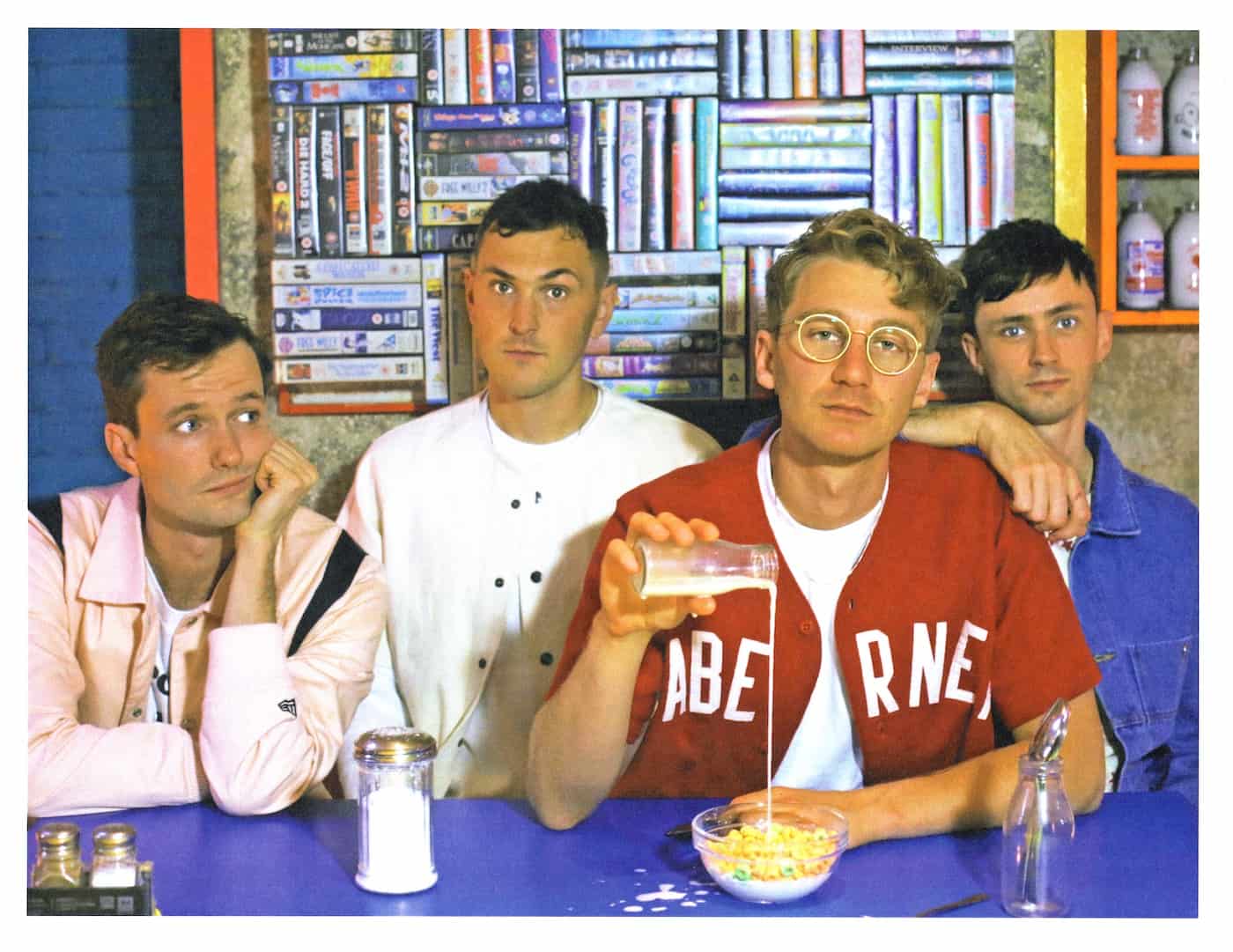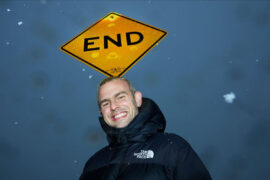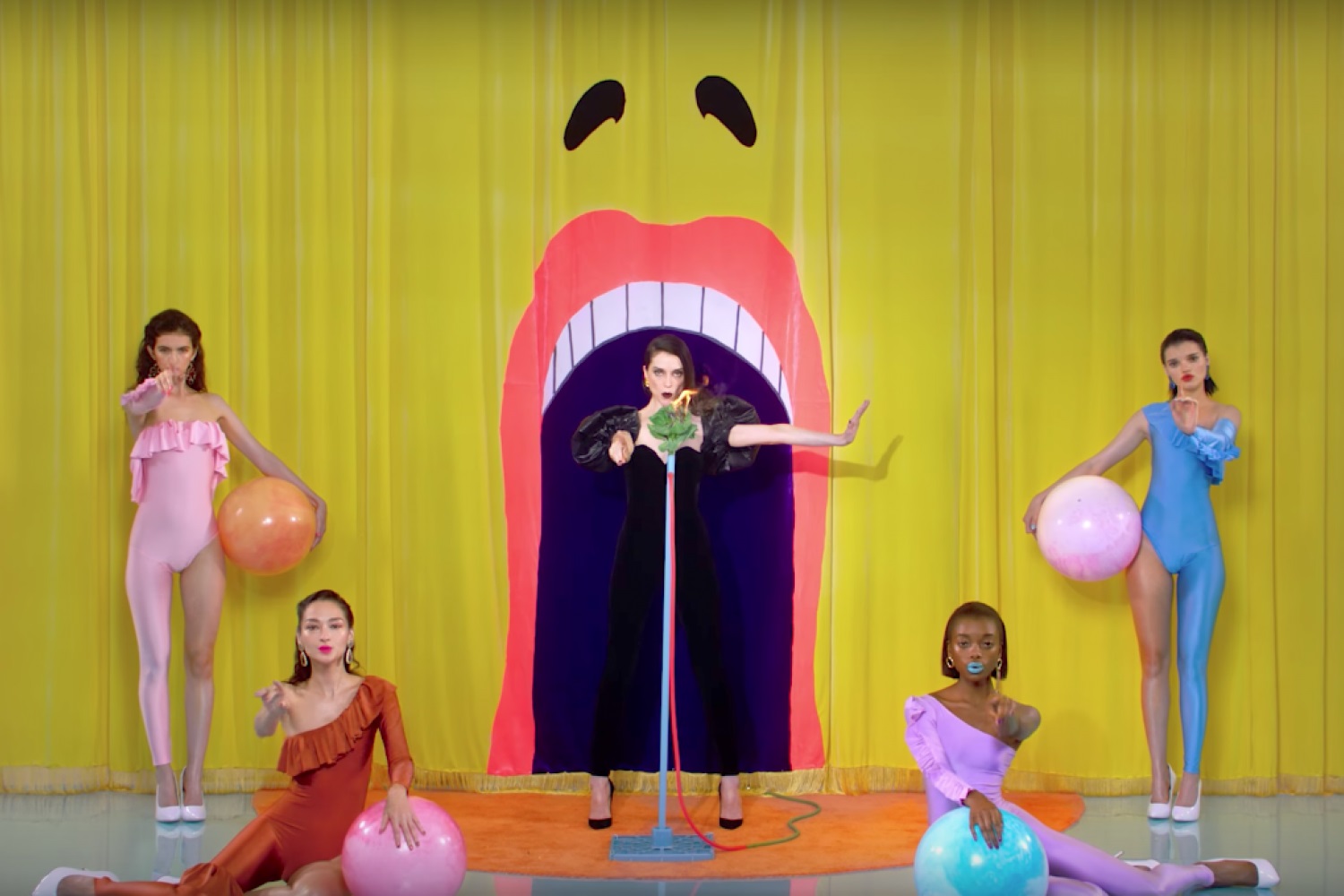“The rebel who cries,” Kelsy Karter dives into her uncompromising debut album ‘Missing Person,’ an impassioned, theatrical upheaval that marries intimate emotion with cinematic and dramatic rock grandeur.
Stream: “Love Me or Hate Me” – Kelsy Karter
I pride myself on being unapologetically myself.
Love her or hate her, Kelsy Karter has found her voice – and it’s as theatrical as it is uncompromising.
It took a long time, but the LA by-way-of New Zealand artist has finally blasted off with feverish flashes and sparks of light in her debut album Missing Person, an impassioned and seismic upheaval that marries intimate emotion with cinematic, dramatic grandeur.
“It’s kind of been an evolution in itself from what I started to where it has ended up,” Karter reflects. “Because when I started it, I was really dark, kind of probably in the worst place in my life that I’ve been in. And I just started out diving into those emotions, tapping into the feelings that I was going through; I was depressed and going through a really bad breakup and a death, and I was broke… I felt like I wasn’t being my true self in my music, in my career, and it was just kind of almost all out of the joint. And so a lot of my music kind of started around that time.”
“And then over the last two years, since that time, it’s literally… My whole world has flipped the other way. And I’ve come out of it happier than ever, completely… It was like a cathartic experience, the last couple of years, and it’s kind of just the journey of losing myself and then finding myself again, and all that came with that, [chuckle] hence, Missing Person.”

Nothing in this world was made for me
There’s nothing anyone can give me
Tryna convince me anywhere is safe
But nothing anyone can say
Could stop me from leaving, leaving, baby
You only die once and we’re not dying here
This house is bound to burn down in a day or two
Gotta get the hell out of town and rocket to the moon
We can’t bear to live in fear
We can’t trust no one ’round here
All we can do is run fast
Grab my hand and don’t, don’t, don’t look back
It’s just you and I from now on
– “You Only Die Once,” Kelsy Karter
Released October 2, 2020 via BMG, Kelsy Karter’s Missing Person is an unabating, unrelenting, and all-encompassing debut. As a title, Missing Person is itself a stirring introduction to Karter’s record. “Many of the songs kind of touch on escapism and wanting to not be yourself, not wanting to be in this world in this place or this life that I was in,” Karter shares. “Like I said, I completely lost myself, I didn’t know really who I was and who I would be. And I just felt like I was missing.”

A longtime artist-to-watch and a mainstay of Atwood Magazine’s coverage since she debuted three years ago, Kelsy Karter has worn many faces and tried on many hats through a brief, exciting career. Songs like “Out of Drugs” and “Sad Sad Summer” have evoked the likes of Amy Winehouse, whilst the rollicking “Catch Me If You Can” revealed a wilder side, blending that charismatic old-school soul with modern pop licks and rock instrumentation. She showcased herself as an artist rather than a one-trick pony, embracing everything and inhabiting the moment.
“The truth is, we are all a million different characters,” Karter says. “None of us are one note, you know, and I like to kind of embrace that about myself and be all the different colours that I am. Musically though, I’ll be honest, I love those songs as songs but I never fully connected with them on a musical level. Obviously, the stories have always been mine, but the way that music makes you feel, or music makes me feel is a huge part of why I make music and how I make music.”
Karter’s “big break” of sorts came with the cheeky Harry Styles ode “Harry,” an Atwood Magazine editor’s pick exploding with desire that we previously described as “a tantalizing letter of lustful intent” and a “catchy thrill-ride that might catapult her career.”
“Let’s just say it did its job and it was an incredible experience,” Karter laughs. “It was one of the funnest things that I’ve done. That definitely like took over my life for a bit, and in a good way, ’cause I was in such a horrible place.”
“Harry” got folks noticing her, but Karter doesn’t want to be known in relation to someone else; she wants us to know her for her. “I don’t want to be a singles artist; I want to be an album artist.”
“There’s been different turns and streets that I’ve had to take to get here, but now in the end, I wouldn’t have it any other way because this music truly is me – and I’m glad that I went through the whole process to find it.”
Karter admits that she never really felt fully like herself until we wrote “God Knows I’ve Tried,” a soul-stirring outpouring of the heart and the first song written for the record. She shines front and center atop a groundswell of warm, immersive harmony. “It’s kind of my freedom song where I was, I always say it’s like, a love letter to myself and an apology letter to everyone else. Because that song is like the song that made me kind of, say, ‘Fuck it, I’m just gonna dive headfirst into who I really am. And if it works, it works.’”

“It was the first song that I was like, I want to make rock music, this is what I’ve always wanted to make, I wanted to marry theatre, and rock and essentially make a rock musical album,” she reflects. “And that’s kind of been my dream because as a kid, I was an actor, and I wanted to be an actor and a director and be in theatre and movies and music – it was kind of something that I did, because my family’s musical. And we all play instruments and in theatre, you had to sing as well to be in the musical. It was like I was training my whole life for something I didn’t really know I wanted to do yet. And then when we wrote “God Knows,” and it was kind of like my “I found it” moment. I started crying over just everything I was going through and how guilty I felt with certain things. And the cool thing about that song was that there wasn’t any, like structural melodies that we were writing. I just kind of risked it and the like, my mate, one of the guys we wrote it with was just kind of noodling on the guitar and it just kind of happened so organically and then turned into this big like rock ballad. And I was like, “Holy shit, I found it like, this is me.” This is my voice. This is who I am musically, in essence. That was the turning point for me.”
“She’s a little rebel,” that’s what they say
I’ve been chasing trouble since back in the day
I don’t wanna grow up, I’m just not built that way
Daddy wishes I was the girl next door
Mama tells me I should smile some more
Baby, I’ve been bad
But God knows I’ve tried to be good
God knows I’ve tried
– “God Knows I’ve Tried,” Kelsy Karter
The earliest of her singles to make it onto Missing Person, “God Knows I’ve Tried” is a stunning template for what turned out to be a majestic, expressive soundtrack to hardship, healing, and self-discovery. Missing Person is Karter’s full puzzle, put together piece by piece. She’s never felt more connected to her art. “Musically, the album is theatrical, emotional, and cocky-ish, cheeky and all the things that I kind of think I am in person, and then lyrically, they’re my stories – so it couldn’t be more me.”
Missing Person opens with the emphatic “You Only Die Once,” a song that was so important that Karter included it on the record twice – at the beginning, and again at the end, acoustically. A raw recognition of the current state of our world, this song – written before 2020 – is a prescient and urgent call to action.
“I do think that it’s important to not be a part-time activist,” Karter explains. “I despise the man in power right now, I despise everything he stands for, and I want to be the kind of artist that speaks up about what she believes in. When I put my political views out there, I get so much backlash. My numbers go down and then they go up and then they get down and it’s quite… You know, it’s just polarizing when people really say their opinions, but I want to be that person that stands up for what she believes in and I pride myself on that. But I also don’t want to be too serious, to take myself too seriously about it, ’cause at the end of the day, what the fuck do I know? So I just have what I feel to go off and what I experienced in my own life to go off of.”
“And these kids, these friends of mine, that are young and influenced by people around them and media and parents and society, I want to try and be a good influence as much as I can ’cause I’m not… I didn’t sign up to be a role model, but I want to make sure that I am in some way being influential in a good way. This is an anthem to anyone who feels lost, like the control is out of their hands and anxiety is taking over. It’s another escapism song where it’s like, the more that we’re in this together. Obviously because of 2020, I felt like I wanted to sandwich the album with it, just because of kind of the essence of the time we’re in now, which is almost a year after I wrote it!”
Karter adds, “It’s so me in the way of its ups and down, and I’m sure like anyone, we’re all up and down, we’re all fucked up and we’re all incredible at some things and terrible at some things, we’re happy some days and sad some days. I wanted the chaos of that to come out in the song and not be afraid of that, ’cause it’s not really a typical format for a song.”
Karter cites “You Only Die Once” and lead single “Liquor Store on Mars” – a transcendent, dazzling explosion in its own right – as her personal favorite songs on the album. Another definitive highlight on the record is “Villain,” a powerful display of alternative rock that conjures up angsty ‘90s jams. Its energy, emotion, and lyrics all hit home with profound force. “I think that’s the underdog of the album,” Karter agrees.
Missing Person didn’t necessarily have an overarching concept to it when Karter began writing the songs. She was just getting shit off her chest.
“When I started the album, I didn’t know I was starting the album,” she says. “We were just kind of writing songs, and I didn’t have much navigation. I was in such a dark place and I was a very angry person and just not myself. It was more just therapeutic to be writing songs; I always want to use my pain in a good way and in a beneficial way. I usually dive straight into my feelings rather than hiding them or bottling them up, and I was kind of like, “Alright, I guess the only way to get through this pain is to use it.” And we just started writing.”
“There wasn’t really a vision at all, but… because so many of Bowie’s songs and songs from back in those days were about escapism, and I had a fascination with space and death and just all these different things that I was kind of re-discovering but you’re kind of curious about as a kid, and then you forget about… I had this curiosity come back in me, where I was asking questions about everything. I wanted the lyrics to kind of talk about that a little bit, and then I just kept writing and writing.”
“I needed this to be somewhat of a visual album and somewhat of a story. I started to pick and choose what went together. You know, you write one hundred songs and then you use two of those songs. I started to visualize how I wanted it to be and kept writing again, and then my life started to change and I started to get really happy, and the pain started to float away. And that’s when, a couple of the songs I was writing at the time started to… Everything started to evolve into a different kind of tyrant. I had to kind of find a moment where I was like, Okay, stop. Stop, let’s compile these songs and make the album and then you can keep writing.”

Kelsy Karter isn’t that angry person anymore; in place of that anger is an assertive, tempest of a record that takes no prisoners. It is at once so true to who she was, but also what she’s left behind. “So much of this album… I was a very angry, sad, depressed person during a lot of this, writing this album… I felt guilty for even putting [some of these songs] on the record because I don’t feel this way anymore, and I had a lot of bottled up anger and it comes out in the music. So a lot of the songs I just kind of try and disconnect myself from, because otherwise I get taken to a rougher place of sadness.”
Missing Person is the embodiment of all those things Karter needed to let go of.
“I think releasing the album is me letting go and getting closure for all the pain I was in and all the pain I inflicted on others. I don’t regret anything, but there’s a lot of guilt. Right now, if I was to resonate with any of the songs right now, when I listen to them, it would be “Love Me or Hate Me” for sure. I just love the punk rock of that song, and I try to live my life the way that that song kind of makes me feel in spite of how I want to feel all the time, which was my intention when writing it. I wanted my fans to listen to it and feel like they could conquer the world so definitely that one. And “Goodness Gracious” – they’re like my two kinda happy, happy songs that were kind of written in the latter part of the process, and how I feel now about my life.”

I want people to feel completely vulnerable and heartbroken and badass and empowered at the same time.
Missing Person is a vessel of relief and reckoning for its listeners. Its songs are potent, hearty forces of nature full of life.
Built upon a foundation of anger and exasperation, pain and frustration, they fly high with resilience and spirited fortitude. Now, Karter can look back and smile.
“Musically, I think I’ve just advanced so much,” she observes. “Like I said, music was never my number one thing. I’m such a visual person. I always saw my life as an actor and a director. Making this album, I’ve realized music is my whole life and I think my biggest strength is my ability to problem solve – I learn very quickly; I’m like a sponge, and I think that this comes from my curiosity. I want to be the best. I don’t want to be like Bowie and Jagger. I want to be as big as them, and evolve like them, and continue to re-invent myself.”
“Fans have called me “The rebel who cries” because I am kind of equal parts emotional and badass at the same time. I want them to feel that way when they listen to Missing Person because, like I said, you don’t have to be one thing: You can be all these different things and not be ashamed of it. In a time where being cool is number one, I have built my career off being cool in people’s eyes by not trying to be cool, and doing a bloody rock musical album. So I hope that people hear that, and want to just be their true selves as well.”
What else can be said of this album? Missing Person rocks; its songs are good on their own, but they’re even better as one high-flying uproar. Kelsy Karter discover herself in the making of this music; inside these songs there is wisdom to be gained and tension to be relieved. Whether you need that kind of catharsis as well, or if you’re just looking for a great time, take a half hour and delve into the electric world that is Missing Person.
Experience the full record via our below stream, and peek inside Kelsy Karter’s Missing Person with Atwood Magazine as the artist goes track-by-track through the music and lyrics of her debut album!
— —
:: stream/purchase Kelsy Karter here ::
Stream: ‘Missing Person’ – Kelsy Karter
:: Inside Missing Person ::

— —
YOU ONLY DIE ONCE
i wanted to write an anthem for anyone who’s pissed off about the current state of the world. feeing anxious and depressed and uncertain of the wellbeing of ourself and our families, friends, etc.
GOODNESS GRACIOUS
this song is about falling in love and the overwhelming feeling of realizing that you found the one you’re truly meant to be with,.
STICK TO YOUR GUNS
i wrote this song to remind myself whos boss. its about standing up for what you believe in, no matter who is telling you otherwise.
I’M SO MAD AT HIM
this is a song i wrote when i was in a very dark, sad and angry place in my life, hence the title. i was going through a breakup and had a lot of resentment at the time. (which is completely changed since then)
VILLAIN
i’ve always had a reputation for being the rebellious one or “bad girl” of any group or relationship i’ve been in. when you’re told something enough times, you start to believe it, this song is simply me accepting the role of the villain if i have to.
DEVIL ON MY SHOULDER
i suffer from a lot of anxiety and this song is simply about that. one way that i cope with my demons is by making friends with them.
LOVE ME OR HATE ME
this is about individualism and being unapologetically you, even if it doesnt fit into society norms, or the opinions of those around you. embracing yourself and all that makes you different.
GOD KNOWS I’VE TRIED
this song is a love letter to myself and an apology letter to everyone else.
CATCH ME IF YOU CAN
when i left my previous relationship, i felt like i did so much damage to him that i killed him inside. i felt so terrible about it. this song is a metaphor for feeling like a criminal.
INT – COFFEE SHOP – NEXT MORNING
this is a poem and a true story of when i met a little old man at a coffee shop. i was crying my eyes out and he gave me some out of this world advice.
LIQUOR STORE ON MARS
this song is about being in so much pain you want to move to space because nowhere seems far enough away.
NEW RECORDING 254 (OUTRO)
this is a voice memo of me singing You Only Die Once at home. i put it at the end to reiterate the importance of speaking up about the current state of the world.
— —
:: stream/purchase Kelsy Karter here ::
— — — —

Connect to Kelsy Karter on
Facebook, Twitter, Instagram
Discover new music on Atwood Magazine
? © Sarah Pardini
:: Stream Kelsy Karter ::








